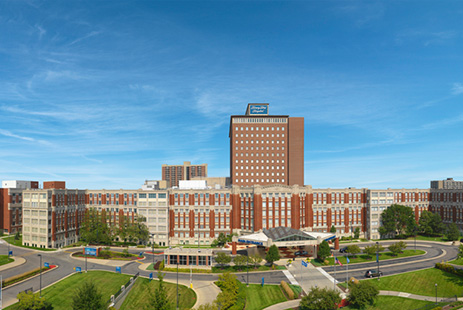The Henry Ford Health System today announced it received a $20 million gift and will use it to launch the Henry Ford Pancreatic Cancer Center. The center will focus on global collaborations to develop new methods for the early detection of the disease, which has a five-year survival rate of 8 percent.
The gift was given by an individual anonymous donor.
“We are grateful for this transformational gift that will allow Henry Ford to bring the best minds in the world together to shine an important light on pancreatic cancer,” says Wright Lassiter III, president and CEO of Henry Ford Health System. “It marks a crucial step in advancing pancreatic cancer research with the goal of increasing survivorship for patients diagnosed with this terrible disease.”
David Kwon, director of surgical oncology of the Henry Ford Cancer Institute and director of the Multidisciplinary Pancreas Clinic at Henry Ford Hospital, will help oversee the new center.
The center will focus on expanding the number of identified biomarkers in pancreatic cancer that can be validated in patients diagnosed with pancreatic cancer, translating the biomarkers into screening tests to detect pancreatic cancer earlier, using artificial intelligence to analyze clinical medical records and radiologic studies to identify previously unidentified patterns in patients’ medical records that may alert providers to the early diagnosis of pancreas caner, and developing investigator-initiated clinical trials to advance pancreatic treatment.
“Never has there been a greater momentum in the fight against pancreatic cancer, and unfortunately, the incidence of pancreatic cancer will only continue to rise,” says Kwon. “To effectively fight pancreatic cancer, we need to work to find solutions to problems that have eluded clinicians and researchers to date, while embracing a culture of innovation and collaboration.”
An estimated 53,670 people are diagnosed with pancreatic cancer each year. There is no effective screening tool available to diagnose pancreatic cancer early, and most people do not experience any symptoms until the cancer has progressed to an advanced stage.
“While we’ve made incredible advances in cancer diagnosis and treatment, where some types of cancer are now curable, pancreatic cancer remains nearly a universally fatal diagnosis,” says DR. Steven N. Kalkanis, medical director of the Henry Ford Cancer Institute and chair of the Department of Neurosurgery. “One of the challenges is pancreatic cancer is often diagnosed late, generally at an advanced stage, making it difficult to treat. If we are going to move the needle, we need a global, crowd-sourced effort to diagnose pancreatic cancer earlier and give patients a fighting chance for survival.”
The gift will establish a global, multi-institutional pancreatic consortium led by Henry Ford; an endowed director’s fund to support the hiring of a pancreatic cancer clinical leader and a research leader for the center; and an endowed fund to establish an administrative director for the center.
The gift builds on the momentum created by Detroit businessman and philanthropist Mort Harris, who donated $20 million to Henry Ford in December 2016 to back the Brigitte Harris Cancer Pavilion in Detroit, which is slated to open across W. Grand Blvd. from the hospital in 2020.
His gift was part of a $40 million package to support the building project and three program areas: precision medicine, brain cancer, and pancreatic cancer, which his wife, Brigitte, battled for almost two years before passing away in 2016. It is largest individual gift in Henry Ford’s history.






